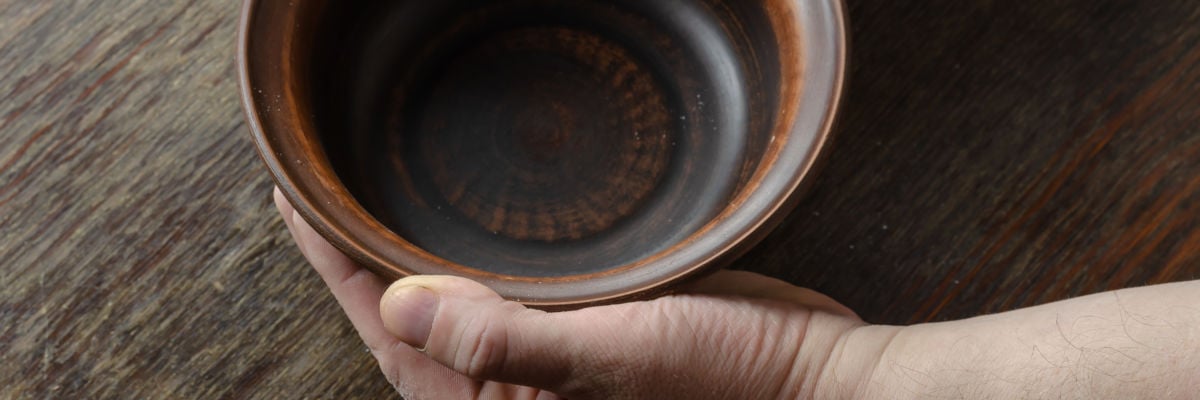
The First Book of Kings, chapter 17, contains the account of the prophet Elijah and the widow of Zarephath. The Church features it in the first reading for the thirty-second Sunday in Ordinary Time, Year B, though the abbreviated excerpt does not provide the full context. As the Polish Jesuit Stanisław Biel points out in his study of Elijah, this passage is a challenge for faith in God’s providence and beneficence, both for the widow and for Elijah.
First, the context: drought-induced famine. The whole region—Israel and adjacent territories—is suffering from famine caused by a years-long drought. That drought is attributed to Israel’s infidelities: God closed up the heavens because Israel had admitted the worship of pagan gods under a foreign queen, Jezebel (with whose prophets Elijah would later have a fiery duel). When the widow says she and her son have virtually no flour or oil and, after they eat their last meager meal, they will die, it’s not just the hardship of their individual circumstances. Everybody is suffering because of the drought.
Second, God sends Elijah to “a widow in Zarephath.” In the Biblical world, “widows and orphans” are the most vulnerable of people, the poorest of the poor. God expects Elijah to rely on a woman whose future sister will have only a “widow’s mite” to drop into the Temple treasury. When it comes to security planning, the Father seems not to be the best fiduciary.
And she is from Zarephath. Zarephath is not in Israel. It is in neighboring Phoenicia, today’s Lebanon, the region of Tyre and Sidon. This means she is not a Jew, not a member of the Chosen People. God sends Israel’s prophet to a pagan woman for support.
As Biel noted, God has already begun softening up Elijah. Before God sends him to the widow of Zarephath, he feeds Elijah in the desert through the agency of ravens. Ravens bring Elijah food. In the Bible (Lev. 11:15), ravens are unclean animals. Elijah must accept that, for his survival, God used unclean birds.
Elijah departs Israel with faith in God that a pagan woman from the poorest social class would be his succor. And when he finally reaches the gates of Zarephath, where he meets her, she’s at her wits’ end, gathering sticks to cook a last morsel for her and a child, admitting that her most basic food supplies—flour and oil—were practically exhausted.
A modern reader might think Elijah presumptuous when, being informed of the widow’s plight, he nevertheless says, “First make me a little cake and bring it to me. Then you can prepare something for yourself and your son” (1 Kings 17:13). First, feed me—your unannounced guest—and then yourself and your child.
Elijah is no fool. The sound of those words may have been as challenging to him as they were to the widow. Both are called to have faith that God will not let them down, that he will protect them. Both are challenged to forgo control and self-reliance calculated according to purely human considerations.
The prophet has already put his faith in God and does so again. The woman puts her faith in this strange man of God from another land and in her people’s tradition of hospitality to the stranger, even at one’s own expense.
And God does great things with faith.
The modern, calculating mind might scoff: “How is it that ‘the jar of flour did not go empty nor the jug of oil run dry’?” But, like Genesis, the Bible is a book of faith: its job is to affirm that God made the world, that he fed his people with manna in the desert, and that the jug did not run dry . . . not how God created a universe, raised quail to feed Israel, or supplied the never-ending jar. Like Elijah and the widow, today’s modern empiricist is also challenged to put trust in God’s assurances.
In many ways, modern man eschews Providence. We Americans, heirs of the Anglo-American deist tradition, have acquired a certain resistance to the idea that God might act in human history outside explicable cause-and-effect ways. Joseph Ratzinger seized upon this proclivity in his Divine Project, arguing that some Catholics have a highly siloed, almost schizophrenic approach to the theology of creation: God created, but as a more hands-off Creator. We need to overcome this rigid dichotomy.
Distrust in God’s providence in history is not limited to cosmological or evolutionary questions. It’s found, for example, in the very “practical” assessment on the part of some people to reject parenthood because their calculus cannot factor in the conviction that God would not harm them because they trust in him. They prefer the “control” of their human horizon to faith in the omniscience of God’s plan.
So the problem of Providence is hardly new. The question is: do we have the faith—like Elijah and like the widow of Zarephath—to believe in it?



